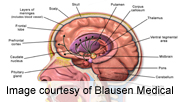- 7 Best Breads for Maintaining Stable Blood Sugar
- Gelatin vs. Collagen: Which is Best for Skin, Nails, and Joints?
- The Long-Term Effects of Daily Turmeric Supplements on Liver Health
- Could Your Grocery Store Meat Be Causing Recurring UTIs?
- Are You Making This Expensive Thermostat Error This Winter?
- Recognizing the Signs of Hypothyroidism
- 10 Strategies to Overcome Insomnia
- Could Artificial Sweeteners Be Aging the Brain Faster?
- Techniques for Soothing Your Nervous System
- Does the Water in Your House Smell Funny? Here’s Why
Antiviral Drug May Extend Brain Cancer Survival, Researchers Say


WEDNESDAY, Sept. 4A drug used against a common virus may lengthen the lives of people with a deadly form of brain cancer, a preliminary study suggests.
Writing in the Sept. 5 issue of the New England Journal of Medicine, researchers reported on 50 patients who were given the antiviral drug valganciclovir (Valcyte) to help treat glioblastoma. The cancer is the most common form of brain tumor in adults, and it carries a dismal prognosis — with a typical survival of just over a year.
These 50 patients, however, fared far better, researchers found.
After two years, 62 percent were still alive. Of the 25 who took the antiviral continuously, 90 percent were still alive. That compared with just 18 percent of patients who received most of the same treatments — including surgery and chemotherapy — but did not take Valcyte.
“These data are by far the best ever seen for these patients,” said lead researcher Dr. Cecilia Soderberg-Naucler, of the Karolinska Institute in Stockholm, Sweden.
A brain cancer expert not involved in the research also voiced enthusiasm. “These are very exciting data,” said Dr. David Reardon, director of neuro-oncology at the Dana-Farber Cancer Institute in Boston.
But he also urged caution because there are many unknowns, and the findings need to be verified in a controlled clinical trial — in which patients would be randomly assigned to take Valcyte or not, and then followed over time.
Valcyte is a pill used to treat cytomegalovirus (CMV) eye infections in people with AIDS. CMV is a very common virus — up to 80 percent of adults contract it by age 40 — and it usually causes no harm in someone with a healthy immune system.
Researchers have found, however, that CMV dwells in the tumor cells of most people with glioblastoma, which suggests that the virus contributes to the cancer in some way.
One recent lab study found that when certain cancer-promoting gene mutations are present, CMV might speed the growth of glioblastoma.
“It appears that the virus alone is not sufficient to cause any human tumors,” said Chang-Hyuk Kwon, one of the researchers on that study.
Instead, it seems that CMV “cooperates with human cancer gene alterations to accelerate development and growth of the cancer,” said Kwon, of the Ohio State University Comprehensive Cancer Center in Columbus.
As Reardon put it, “For some reason, these [glioblastoma] cells are a place where CMV likes to proliferate.”
That has been known for several years, he said. The news here is that an anti-CMV drug might extend people’s survival.
Still, there are questions, he said. The study, which was funded partly by Valcyte maker Hoffman-La Roche, included 50 patients from a single hospital. Many were given the antiviral drug as part of a “compassionate use” program at the hospital.
The researchers then compared them with 137 patients who were treated for glioblastoma at the same hospital around the same time, but were not given Valcyte. All patients in both groups received standard treatment, which typically meant surgery, chemotherapy and, in many cases, radiation.
Reardon said the problem with that type of study is that there’s a risk of bias. Patients who were chosen to receive Valcyte may have been younger, in better overall health and more likely to respond to treatment.
On the other hand, he said, the survival figures for the Valcyte patients were “so far above average, it’s hard to imagine they’re just the result of cherry-picking the patients.”
Reardon said more work is needed to see what drug dose is optimal, and whether patients have to take it indefinitely.
Another question, Kwon said, is whether the drug treatment actually reduced CMV levels in the patients’ tumors, or if the virus was still lurking.
Plus, there’s a risk of side effects with Valcyte, Kwon said, including diarrhea, vomiting and upset stomach. It can also harm kidney or liver function.
Despite all that, Kwon said, given the poor prognosis with glioblastoma, “anti-CMV treatment should be seriously considered.”
Doctors could prescribe Valcyte for glioblastoma patients, Reardon said. But since it’s not specifically approved for the cancer, insurers may not pay — a big obstacle, since the drug costs a couple thousand dollars a month.
Glioblastoma is diagnosed in two or three people per 100,000 in the United States and Europe, according to the National Brain Tumor Society. No one is sure what causes the cancer, but it is more common in men and in people older than 50.
More information
The National Brain Tumor Society has more on glioblastoma.
Source: HealthDay
Copyright © 2026 HealthDay. All rights reserved.










